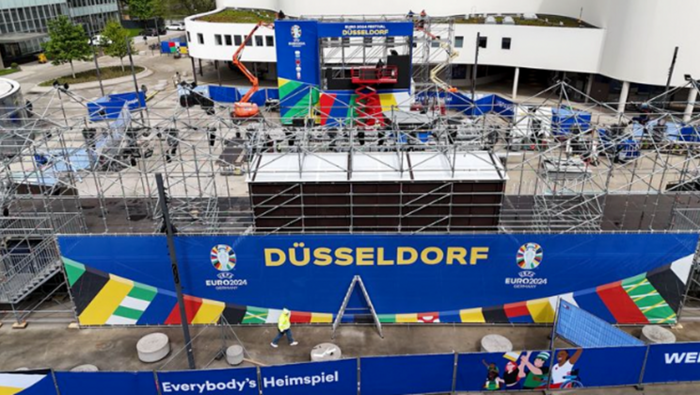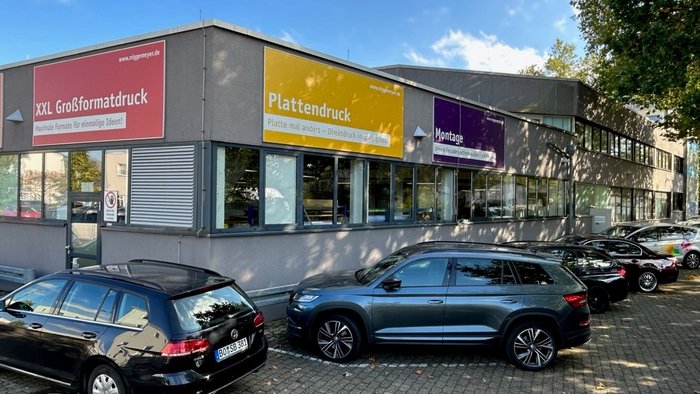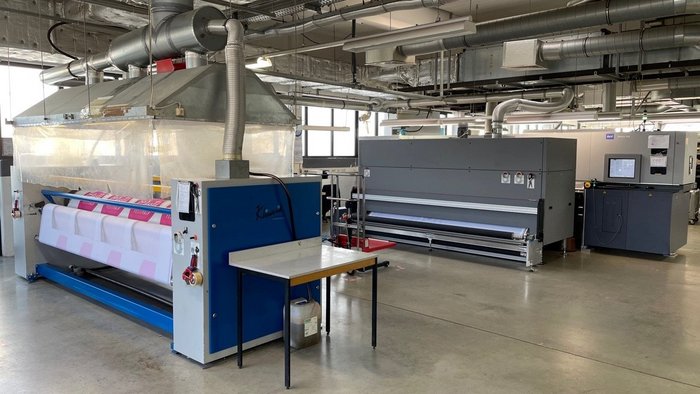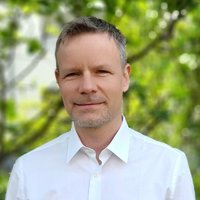The Bochum-based print service provider Niggemeyer Pro Imaging set out on the road to sustainability two years ago. It wasn't always easy - but today the company is reaping the benefits. Managing Director Roland Niggemeyer has a specific wish for financial institutions.
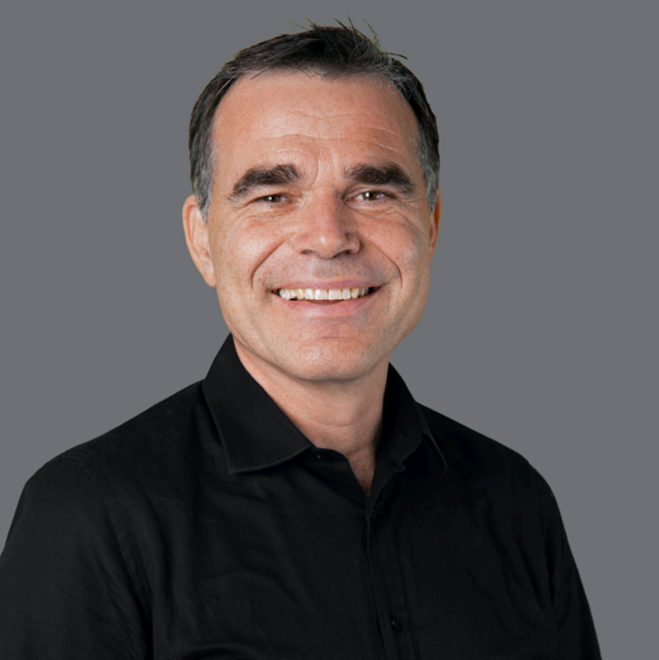
Mr. Niggemeyer, XXL print jobs are the specialty of Niggemeyer Pro Imaging. You print banners and façade posters, for example. What is the maximum size of the fabrics?
Roland Niggemeyer: We have already produced building wraps of 5,000 square meters. The maximum width we can print on a web is five meters. The length is specified by the industry - a roll of fabric is usually 150 meters long. If a customer orders a banner from us that is 100 meters wide and 20 meters high, we print 20 strips of 5 x 20 meters each and then weld them together into one piece.
Your grandparents founded the business as a photo store, your father later turned it into a photo lab. You yourself started in the 1990s - in the middle of a major transformation.
Back then, there was a shift from analog to digital photography and from photo to digital printing. All photo labs suddenly had to adapt. My brother-in-law and I turned the specialist lab into a service provider for large-format digital printing. This is still our core business today.
When did the topic of sustainable transformation first come up?
That was in 2009. I remember a trade fair where the requirement was that everything had to be made from recyclable materials. But then came the financial crisis and the topic of sustainability disappeared again for a while. It didn't become relevant again until 2022, when EU projects such as CSRD and the Supply Chain Due Diligence Act gained momentum.
Had you already set off then?
We had already started experimenting with sustainable materials in 2009. But it only really got going two years ago. At that time, the first fabric manufacturers offered us materials made from recycled raw materials, such as shredded plastic bottles. Inks with the Oeko-Tex label came onto the market. More importantly, customers started asking for CO2 footprinting for their posters and banners. Some, especially in the high-end fashion or sports segment, even made sustainability certificates a requirement.
What challenges did you have to overcome to achieve this?
Back then, we formed a team of five and read up on the subject. It quickly became clear that we wanted to be certified in accordance with the European environmental management standard EMAS and the German ISO 14001. It was clear to me that we needed someone to take us by the hand and guide us through the bureaucratic jungle. We finally ended up with an agency from Würzburg.
How did the process go?
The whole process took a little less than two years because, after all, we primarily have to deal with our day-to-day business. We had an EMAS meeting every two weeks where we assigned tasks. We turned the whole store inside out. It wasn't just about materials, but also about things like storage, occupational safety, labeling and - last but not least - getting our 50 employees on board. We gave them all sustainability cards, among other things: What can I do myself at my workplace? What ideas do I have to get involved in this process?
Sounds challenging. Where do you see the greatest opportunities in terms of transformation?
The big opportunity is that our path will be appreciated by our customers. And that we will eventually achieve a genuine circular economy in our industry. We told our customers about this right from the start. When we were certified, they could read about it on our website and in our email signature. Our EMAS environmental statement has been published. We have received extremely positive feedback. Right down to the fact that we only won some projects thanks to our commitment to sustainability.
You are alluding to the European Football Championship. Back then, Niggemeyer produced all the banners for the Uefa fan zone in Düsseldorf. How did that come about?
The city of Düsseldorf had decided that the fan zone materials should not simply be disposed of and incinerated after the European Championships, but should be reused and recycled. We put together an attractive package: firstly, our materials were certified and came from 100% recycled material. Secondly, we offered the city to take back all the fabrics and make yarn from them again. We were able to do this because our supplier agreed. That's how we ultimately won the contract.
Do sustainability criteria already play a role in many tenders?
More and more. One example is the Otto Group: they have committed to being CO2-neutral by 2030 - and they expect the same from their suppliers. We're also opening doors at museums and public institutions. For others, however, the topic is still in its infancy.
What does the transformation mean for your company in concrete terms? Is it “just” about materials or is it also about major investments such as printing presses?
We see this at trade fairs: Next-generation machines are becoming more and more economical in terms of ink and energy consumption. And a lot is going in the direction of recycling. For example, we have a new machine from HP that can be dismantled into its individual parts at the end of its service life - and each part can be sorted and recycled. These aspects are important decision criteria for me today when we purchase new machines.
A new printing press can easily cost half a million euros. Does your company have sufficient financial capacity to cope with the transformation?
Let's leave the machines aside for a moment, because I always have to invest in different areas anyway: We need environmental management officers, training of all kinds, process optimization, digitalization, etc. It all costs money. And at the end of the day, we are a commercial enterprise. That's why we've postponed the purchase of a photovoltaic system, for example: covering 30% of our energy needs simply doesn't pay off at the moment. But wherever possible, we opt for the sustainable option.
What forms of financing or financing plans do you have?
Our financing partners are our house banks, Volksbank Bochum Witten, for example. Another major investment is due in 2025. This will involve financing for the workflow and a new printing press.
What challenges do you face when it comes to transformation financing?
I don't yet see banks supporting companies like us along the way. They are sympathetic to our activities, but there are no plans to offer discounts on loan interest rates, account management fees or liability. It would give things a real boost if a financial institution said: “If you want to get loans even more cheaply, you have to provide proof of sustainability certificates, audits, recognized seals, etc., for example.
Are banks already asking for sustainability criteria?
I think something is developing here. Here in Bochum, for example, there is GLS Bank, which is driving the issue forward. As a bank customer, it would also be important to me that the half a million I borrow from the bank comes from sustainable sources myself. Because that, in turn, can have a positive impact on my ecological balance sheet.
How does the issue of reporting obligations affect you?
Not yet for us as a small company. But I am noticing this with larger companies that we work for. They now regularly ask whether we are able to prepare the relevant figures on the subject of carbon footprints. I'm actually surprised that it's not more massive yet. By 2026 at the latest and beyond, when more and more companies will have to disclose their sustainability activities, this will become a huge issue. Auditors should start preparing for this.
About the company
Niggemeyer Pro Imaging is a specialist in large-format image production. With its 50 employees, the Bochum-based company produces outdoor advertising in maximum format and fabric prints for indoor use, including technical production, further processing and assembly. Every week, banners the size of a soccer pitch leave the company's halls.
More information at www.niggemeyer.de
